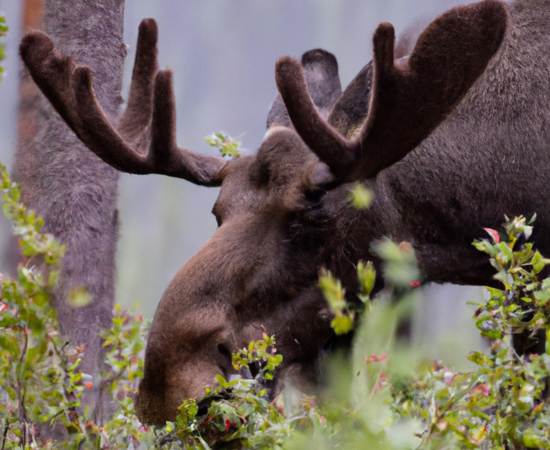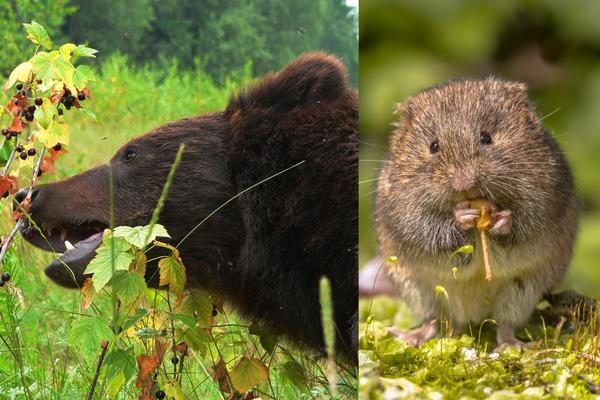Yes, moose are known to eat a variety of plant material, including berries. In fact, berries can be an important part of a moose’s diet, especially in the summer and fall when they are in season.
Moose will often feed on a variety of berry species, including cranberries, blueberries, raspberries, and strawberries, as well as a variety of other fruits and plants.
They are known to be opportunistic feeders and will take advantage of whatever food sources are available to them.
Contents
Do moose eat blueberries?
Yes, moose are known to eat blueberries. Blueberries are a type of berry that grows on shrubs and is native to many parts of North America, including the habitat of moose. Blueberries are often a significant food source for moose, especially in the summer and fall when they are in season.

Moose are known to forage for food in a variety of habitats, including forests, meadows, and wetlands. They are opportunistic feeders and will eat a wide variety of plant material, including leaves, twigs, bark, and fruit.
When feeding on blueberries, moose will typically move through an area, browsing on the plants and consuming the ripe berries that they find.
In addition to eating blueberries, moose will also consume other types of berries and fruits, as well as a variety of other plants. They have a diverse diet and will take advantage of whatever food sources are available to them.
Do moose eat juniper berries?
Yes, moose are known to eat juniper berries, which are a type of berry that is produced by juniper trees. Juniper berries are typically small, blue-gray or purple in color, and are often used in cooking and as a natural flavoring for various types of food and drink.
Moose are known to feed on juniper berries, especially during the winter months when other food sources may be scarce.

Juniper berries are high in protein and other nutrients, which can be important for moose during the colder months when they need to maintain their energy levels and build up fat reserves to help them survive the winter.
In addition, juniper berries contain compounds that may have medicinal properties, which may help to support the overall health and well-being of moose.
Moose will typically consume juniper berries by eating the leaves, branches, and berries of juniper trees. They may also feed on other parts of the tree, such as the bark, if other food sources are not readily available. Moose are known to be opportunistic feeders and will take advantage of any food source that is available to them, including juniper berries.
Do moose eat mountain ash berries?
Yes, moose are known to eat mountain ash berries, also known as rowan berries. Mountain ash berries are typically ripe and available for moose to eat in the fall, after the leaves have fallen from the trees. Moose will often browse on the berries, twigs, and leaves of mountain ash trees, especially when other food sources are scarce.
Mountain ash berries are a good source of nutrition for moose because they are high in antioxidants and other beneficial compounds. They also contain vitamin C, which can help moose maintain a healthy immune system and support their overall health.

In addition, mountain ash berries can be an important food source for moose during the fall and winter months when other food sources may be scarce, helping them to survive and thrive in their natural environment.
It’s worth noting that moose are known to be opportunistic feeders and will take advantage of a variety of food sources that are available to them. While mountain ash berries may be an important part of a moose’s diet, they are likely to also consume other plants and foods as well.
Do moose eat cranberries?
Yes, moose are known to eat cranberries. Cranberries are a type of berry that grows in wetland areas and is native to North America. Moose are found in a variety of habitats throughout North America, including areas where cranberries grow.
Moose typically eat cranberries in the summer and fall when the berries are in season and readily available. They will often feed on cranberries in wetland areas where the berries grow.
Moose will eat cranberries by foraging for them in the underbrush or by standing in shallow water and using their long legs and hooves to reach down and pull the cranberry plants up to their mouths.
Cranberries can be a healthy part of a moose’s diet because they are high in antioxidants, which can help to support the moose’s immune system.
In addition, cranberries are low in calories and are a good source of fiber, which can help to keep the moose’s digestive system functioning properly. Finally, cranberries contain a variety of nutrients that can help to support the overall health and well-being of the moose.
Do moose eat raspberries?
Yes, moose are known to eat raspberries, as well as a variety of other berry species. Moose typically feed on raspberries and other berries in the summer and fall, when they are in season and readily available. Moose will often forage for berries in forests, along rivers and streams, and in other areas where these plants grow.
Eating berries can be beneficial for moose in several ways. For one, berries provide a source of nutrition, including carbohydrates, vitamins, and minerals. They can also help to supplement a moose’s diet with antioxidants and other phytochemicals that may have beneficial effects on their health.
Additionally, berries can help to maintain a moose’s hydration, as they contain a high amount of water. Overall, incorporating berries into a moose’s diet can help to support their overall health and well-being.
Do moose eat blackberries?
Yes, moose are known to eat blackberries, especially when they are in season and available. Blackberries are a type of berry that grows on bushes and are native to many parts of North America, including areas where moose are found.
Moose are known to be opportunistic feeders and will take advantage of whatever food sources are available to them, including a variety of plants and fruits.
Moose are generally found in forested areas, and blackberries often grow in these areas, making them a readily available food source for moose. Moose will often forage for food by browsing on plants and shrubs, and blackberry bushes are a common food source for them.
Blackberries are a healthy food for moose because they are high in nutrients and provide a good source of energy. Blackberries are rich in antioxidants, vitamins, and minerals, and are also a good source of fiber.
These nutrients can help to support the overall health and well-being of moose, especially during the summer and fall when they are preparing for the winter season.
It’s worth noting that moose are known to eat a wide variety of plants and fruits, and their diet may vary depending on the availability of different food sources. While blackberries may be a common food source for moose in some areas, they may not be as readily available in other areas. As a result, moose may eat a variety of other plants and fruits in addition to or instead of blackberries.
What other animals will eat wild berries?
Many animals eat wild berries as a source of nutrition. Some examples of animals that eat wild berries include bears, deer, elk, birds, and small mammals like rodents and rabbits.
Wild berries are typically available in the summer and fall, and animals will often feed on them during these seasons when they are in abundance.
In some cases, animals may also store berries for later consumption, either by burying them or putting them in an empty tree!

Bears, deers, elk and rodents, such as mice, squirrels and groundhogs, are all known to enjoy eating berries as part of their diet. Berries are a good source of nutrients and provide a tasty treat for these animals.
Bears are omnivorous animals and have a diet that includes a variety of plants, berries, and insects. They are particularly fond of berries and will often spend a significant portion of their time foraging for them in the wild.
In fact, berries can make up a significant portion of a bear’s diet, especially in the summer and fall when they are most abundant. Bears have been known to eat a wide variety of berries, including raspberries, blackberries, cranberries, and blueberries.
Deers are herbivores and rely on a diet of plants, including berries, to survive. They are known to eat a wide variety of berries, including blackberries, raspberries, and strawberries. Elk, which are also herbivores, have a similar diet and also enjoy eating berries.
Rodents, such as mice, squirrels, and groundhogs, are also known to eat berries as part of their diet. These animals are omnivorous and will eat a variety of plant and animal matter. Berries are a tasty treat for these animals and provide them with a source of nutrients.
There are many reasons why wild berries can be beneficial for animals. For one, they are a good source of energy, as they contain sugars and other carbohydrates that can provide the animal with the fuel it needs to survive.
In addition, berries are often rich in nutrients like vitamins and minerals, which can help animals maintain good health.
For example, berries like cranberries and blueberries are high in antioxidants, which can help reduce inflammation and protect against diseases like cancer.
Overall, wild berries can be an important food source for a variety of animals, and they can play a role in maintaining the health and well-being of these species.
Conclusion
In conclusion, moose are known to eat a variety of plant material, including berries. Different types of berries that moose are known to eat include blueberries, juniper berries, mountain ash berries, cranberries, and raspberries, among others.
These berries can be an important part of a moose’s diet, providing them with essential nutrients and energy. Moose are opportunistic feeders and will take advantage of whatever food sources are available to them, including wild berries.
It’s worth noting that while berries can be an important part of a moose’s diet, they are likely to also consume other plants and foods as well.




